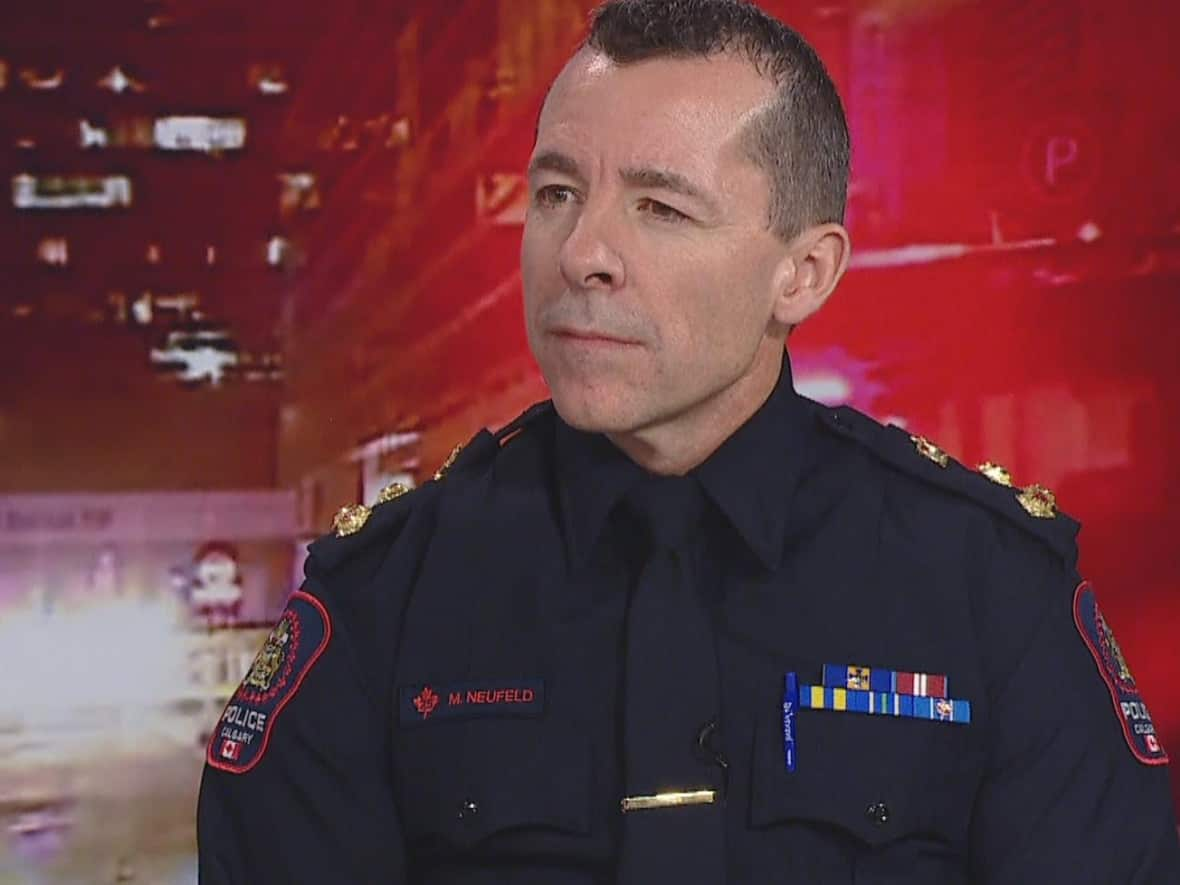Retired and rehired in 24 hours: Calgary police chief criticized for 'secretive' deal with deputy

Calgary police Chief Mark Neufeld made a secret deal with one of his deputies which saw the senior officer retire one day only to be rehired the next, allowing him to collect two pensions plus a nearly $250,000 per year salary, CBC News has learned.
On top of that, the City of Calgary has a policy prohibiting employees from returning to work within 90 days of retiring unless an exemption is granted from the HR department, but the chief could not confirm he received the required permission.
Instead, Neufeld said CPS "followed the legal advice" it received regarding the deal.
"I don't know, I didn't have the conversations myself," said Neufeld. "I just want to be careful with the language; I wouldn't say 'permission,' we don't necessarily go looking for permission all the time.
"What I would say is that the appropriate people were in the loop on this all the way along."
Announcement removed from archive
In a supplementary statement, CPS also said the "appropriate parties were notified of the intentions."
"The deal was structured to address any risks involving the 90-day rule. We did this with legal guidance," reads the emailed statement from the service.
The new contract was supposed to be protected by what's commonly called an NDA (non-disclosure agreement) but in the last six weeks, news of Deputy Chief Paul Cook's November retirement accidentally made it into the Chief's Orders, an internal publication, according to high-ranking sources within the service who CBC News has agreed not to name because they fear professional ramifications.
The bi-weekly Chief's Orders live in an online archive but the edition announcing Cook's retirement was quickly pulled from the archive, the sources say.
"This type of secretive back-room deal will serve to further erode CPS employees' trust in the chief and his executive leadership team," said one officer.
Deal made to get deputy on fixed-term contract: chief
But the chief said the confidentiality provision is standard in senior executives' employment contracts.
"I don't think there's any more secrecy to this than there is around any contract negotiation with any deputy chief or senior executive," said Neufeld.
The confidentiality provision has been partially lifted since the Chief's Orders technically breached the order, CPS confirmed.
"He wasn't being moved, he wasn't leaving the organization, there was nothing materially changing about his role or function inside the organization. So that should not have been on the personnel orders to begin with," said Neufeld.
The chief said he used the deal to get Cook onto a fixed-term contract, "to bring his employment conditions in line with those of his colleagues."

Commission learns of 'internal controversy'
The other three deputy chiefs are on fixed-term contracts which allows CPS to have workforce and succession plans, said the chief.
"The parties mutually negotiated a compensation arrangement that was beneficial to CPS and DC Cook," said CPS in a written statement.
The Calgary Police Commission (CPC) said it became aware last week of "some internal controversy surrounding a rumoured employment agreement made with a deputy chief."
"We are not typically directly involved in this process, but expect employment arrangements to be a responsible use of public resources and to be consistent with the policies set by both the city and our commission," said the commission in a written statement.
The CPC says it will be requesting more information from the service "to learn what has actually occurred and to determine if any further action is needed."
Overcap pension plan
Cook has been with the service for 32 years and was promoted to deputy chief in 2015. He also acted as interim chief for six months in 2015.
A deputy chief makes between $217,000 to $250,500 per year, according to CPS's 2022 compensation disclosure.
Cook qualified for the city's Police Chief and Deputies Overcap Pension Plan (PCDOPP) which is supplemental to the Special Forces Pension Plan that applies to all Calgary officers.
Under the deal, a chief or deputy is given the difference between the CPS pension cap and what they'd be entitled to based on their salary if there was no cap.
In Cook's case, this amounts to a number sources have pegged to be between $800,000 and $1,000,000.
A 'reputational hit'
The PCDOPP can be paid out in a lump sum or in monthly payments. CPS said "a lump sum was not paid out" in this case.
Cook was always entitled to that overcap payout upon retirement.
But it's the secrecy surrounding the deal and double standard for members of the executive that doesn't sit well with some.
"This doesn't pass the smell test. A lot of members are upset by it," said one officer.
Cook has been described as a "well-liked" deputy whose 32 years' experience is invaluable.
Still, the deal feels like a "reputational hit" for a service which has "been through enough," said one of the officers.
Cook did not respond to CBC's request for comment.


